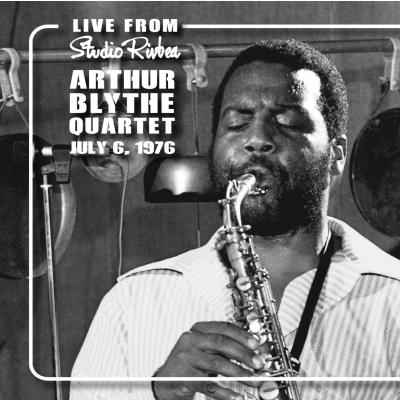Featuring:
| 1. Spirits in the Field |
7:03 |
| 2. Medley of Unidentified Titles |
17:42 |
| 3. Miss Nancy |
19:31 |
| 4. Lower Nile |
5:25 |
Pierre Crepon - New York City Jazz Record
What would Studio Rivbea regulars have known of alto saxophonist Arthur Blythe (who passed away at age 76 in 2017; he would have turned 85 last month), when they attended this live performance in July 1976? The altoist was still an NYC newcomer—he’d arrived in the city from Southern California two summers before, working security jobs. This gig was his first as a leader at the nowfamed loft, although he’d already appeared there a few times in bands led by saxophonists Charles Tyler, Frank Lowe and David Murray—musicians who had toiled in obscurity in California, as Blythe did before 1974. In Los Angeles, he’d mainly played with pianist Horace Tapscott in small group and big band settings. His other associates included pianist Raymond King, drummer Charles Moffett and drummer-writer Stanley Crouch. The saxophonist had also recorded with Tapscott, with fellow saxophonist Azar Lawrence, and had appeared, uncredited, on Black Panther Party minister Elaine Brown’s two records. Drummer Chico Hamilton gave Blythe his New York break, hiring him in 1975 and calling him “the best saxophone player I’ve had since Eric Dolphy.” High praise, given that statement would include Charles Lloyd who immediately succeeded Dolphy in Hamilton’s groups. Blythe credited the veteran bandleader with giving him a sense of how to structure a performance to flow from point A to point B. This attention to presentation is strongly in evidence on this previously unheard, recently released archival tape. With “Spirits in the Field”, it starts with serious unaccompanied alto. Blythe sounds confident, feet firmly on the ground, playing originals without attempting to mask the nakedness of solo playing with pyrotechnics. Despite the non-hi-fi quality of the tape, his large, tenor-influenced sound on alto is absorbing. He saw the loft environment as an “alternative showcase situation” and here he makes the best of it. After a dozen minutes of solo playing, Juini Booth (bass), Steve Reid (drums) and Muhammad Abdullah (congas) seamlessly join in for what is a “Medley of Unidentified Themes”. The music quickly picks another pace and enters denser territory it will not leave before the saxophone-percussion finale, territory situated somewhere at the frontier of free playing. The medley retains the spirit of the avant garde but seems to purposely avoid the register of harsh exasperation favored by certain players. Instead, the quartet shines in the often-neglected area of sonic balance and structural diversity. Blythe would later record much of this material elsewhere, including what is a 19+ minute rendition of “Miss Nancy”, one of his most memorable melodic originals, here anchored by Booth’s deep bass lines and expanded from the seven and a half-minute studio version released on the saxophonist’s Illusions (CBS-Columbia, 1980). The fact that this concert wasn’t segmented to fit LP format limitations gives it a most interesting edge. This release again demonstrates, if need there still be, the value of a label like NoBusiness (and its Rivbea Live! Series, for which this release is the second volume) that favors the real deal over artificial hype.
Fabricio Vieira - FreeForm / FreeJazz
O Volume 2 de Live From Studio Rivbea traz outro saxofonista, Arthur Blythe (1940-2017). Da mesma geração de Kalaparusha Maurice McIntyre, Blythe teve uma história distinta. Vindo de Los Angeles, também chega a Nova York na era loft e faz seu nome especialmente na segunda metade dos anos 70. Em 1979, ele assina com a Columbia, selo com o qual ficaria associado por cerca de uma década, lançando quase dez álbuns nos quais se abriu ao jazz contemporâneo sem perder sua criatividade. Se não chegou a ser uma estrela do jazz, Blythe teve relativo sucesso (chegou até a tocar no Brasil em 2003, no Chivas Jazz Festival). Este novo registro que chega é um testemunho relevante do começo da carreira de Blythe, que ainda não havia feito sua estreia em disco como líder. Aqui ele comanda um quarteto com Juini Booth (baixo), Muhammad Abdullah (congas) e Steve Reid (bateria). O registro, feito em 6 de julho de 1976, ocorreu poucas semanas após as sessões de “Wildflowers” – das quais Blythe não participou. Apenas ao sax alto, Blythe mostra que estava pronto para começar a demarcar seu espaço, com temas marcantes espalhados por quatro faixas, que vão de 5 a 19 minutos. Peças conhecidas de Blythe que apareceriam em álbuns futuros, como “Miss Nancy” e “Spirits in the Field”, estão presentes nesta gravação. Um tesouro para os fãs de Blythe. Agora é aguardar o que mais o NoBusiness Records trará nesta nova fundamental série.
